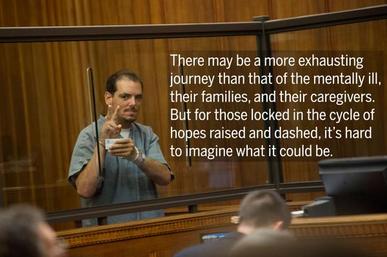
"Mike was 33 years old. He’d been in and out of institutions for half his life, since he first got sick when he was 17. His diagnosis had changed over the years — it was #schizophrenia, then #bipolar disorder, then #schizoaffective disorder — and his medications were in constant flux. Things stayed good for a while, then went bad again. Now Mike’s medications seemed to be working, and he was saying that he wanted to stay on them — a view he didn’t always take. But there had been so many days like this, so many hopeful new beginnings.
Often, when bringing him home from a hospital stay, Peggy saw again the man she knew: funny and charming, intelligent and sweet. And then she watched that man disappear, receding from her as though into the depths of a lake. He was replaced by someone else, whose thoughts she did not understand. Mike suffered at times from #delusions. His mother never feared him, but some of the neighbors did, interpreting his loudness and profanity as threatening.
Peggy had lived for years with the constant worry. She had lived with the complaints from neighbors and the calls from the police in the middle of the night; she had coped with Mike giving all his money to strangers or throwing all their food away, believing it was poisoned. She had watched his friends grow up and get jobs and get married, while he remained trapped in place. Yet she still believed that one day, the right treatment would free them. Mike would stay well, and she would have her son back."
- "Part 1 of 3: Brave and Afraid and Heading Down The Longest Road" by Jenna Russell (Boston Globe)
- "Part 2 of 3: Days of Crisis, Compassion, Faith and Futility" by Jenna Russell (Boston Globe)
- "Part 3 of 3: Desperately Guarding a Spark of Hope" by Jenna Russell (Boston Globe)



 RSS Feed
RSS Feed
